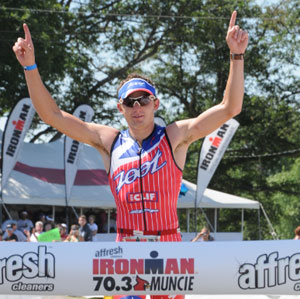Once a Runner…
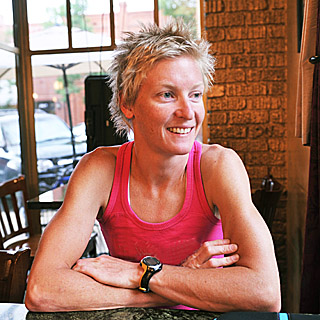
Melissa Rollison looks like a happy, sunny elf sitting in Saxy’s Café in downtown Boulder sipping a coffee and communicating with a barrage of emailed congratulations from throughout the world on her iPad-like device. Her short-cut blonde hair sticks up at jaunty angles and her bright smile sets off her casual bright pink T shirt that fits in well with young students, athletes and entrepreneurial sorts who enjoy Saxy’s organic sandwiches and caffeinated inspiration.
Rollison has a lot to be happy about. In her first two weeks after traveling from Australia in the United States, she rocked the Ironman 70.3 world with two smashing victories. On July 9, she blew past two-time World Champion Leanda Cave and top ranked 70.3 competitor Kelly Williamson while running 1:19:19 and setting a course record of 4:08:48 to win Ironman 70.3 Muncie. The next week, Rollison duplicated her triumph against a tougher field, out racing Cave once again and outrunning and out racing 2007 Ironman 70.3 World Champion and 2010 Ironman World Champion Mirinda Carfrae at Vineman 70.3. On the way, Rollison set a Vineman 70.3 course record of 4:09:00 and topped off her big margins over Cave and Carfrae with a sizzling, race-record 1:16:28 run that outpaced Carfrae, the gold standard for women 70.3 runners, by 1:49.
Those performances prompted the triathlon world to react much like the banks after being hit by the daring duo Butch Cassidy and the Sundance Kid. “Who is that gal?” Turns out she was world class runner who suffered a long series of hard luck and hard knocks before turning happily to triathlon.
Slowtwitch: What did you play growing up?
Melissa Rollison: I was always really active. For fun I’d climb trees. Skateboard. Rollerblade. Run around playing Tiggy, Chasey. I played basketball and soccer for fun. I liked kicking balls around. We didn’t watch much television. I always preferred to go outdoors and play.
ST: Did that lead to some accidents?
Melissa: I was really accident prone when I was young. Broke my collarbone. Broke an eardrum. Had every injury under the sun.
ST: How did you break your collarbone?
Melissa: I fell off a swing before school when I was 7 or 8 years old. I was so shy back then I didn’t tell anyone. I got on the bus and went to school. It hurt all day. I couldn’t take my jumper off. It wasn't until 3:30 that I got home and told my mum, “Oh my shoulder hurts.” Then she took my jumper off and saw the bone sticking out.
ST: How did you puncture your eardrum?
Melissa: Mum had a comb with one of those big long sharp handles. I was just sort of tickling my ear with it when I hit a wall and it went straight through. Thank goodness it healed.
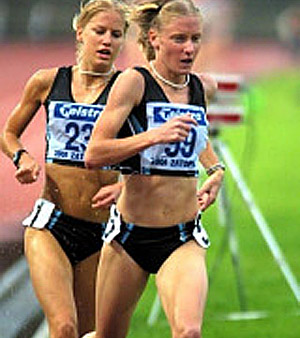
ST: What was your first big sporting experience?
Melissa: When I was in 11, I ran in the state cross country championships for 12-and-under and placed 15th. Not too great. But I liked it and I said I want to run!
ST: Wasn’t it pretty daunting for an 11 year old to hop right in and run 3000 meters?
Melissa: No we had to run it in Coolangatta Primary School. When they saw me, coaches encouraged me to go to state. And I wanted to go.
ST: Did things get more serious after that?
Melissa: I started to train with a coach after that. Brian Chapman lived in Tweeds just a 5 minute walk from my parents. We were all young. Probably the oldest was like 15 or something. He’d blow the whistle and you’d run. He’d blow the whistle and you’d stop. I just loved it. There were only two sessions a week and I couldn’t wait for Mondays and Wednesday so I could go run after school on the soccer field.
ST: Running on grass is nice. Did you wear shoes?
Melissa: I started out barefoot. Up to the age of 12 and 13, I raced with bare feet.
ST: Fifteen years before you, there was Zola Budd.
Melissa: My coach said I reminded him of her – the bare feet, the determination. Obviously I’d never heard of her, but he made sure to let me know her story.
ST: Did you have any sports heroes?
Melissa: I never had any idols.
ST: You were more interested in playing the sports yourself?
Melissa: Straight after I won the nationals at age 12, I said “I’m gonna be an athlete. I’m going to go to the Olympics.” So pretty much from there it was serious. But I didn’t start training hard until I was 16 and I upped it to three sessions a week with Brian.
ST: At the Australian Olympics in 2000, you were 17. What do you remember about them?
Melissa: I was a little basket carrier at all the track events. I would carry a basket out and the athletes would put their clothes in it and I’d carry it off the track. I got to see all the races.
ST: You saw your country’s great 400 meter runner Cathy Freeman,
Melissa: Yes. I was sitting right by the track while she was running.
ST: What did you think of her – she represented the Aboriginal heritage of your country. They had been oppressed and were finally being respected in Australian society?
Melissa: I was young. I didn’t read much. I didn’t know the full story of how she got there and what it meant. I just saw she got to the Olympics and she won. I was all excited. It was an awesome time.
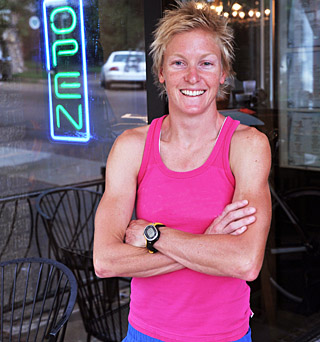
ST: How did your running progress through high school?
Melissa: I pretty much won nationals every year all through high school. By 17 or 18, I was running just over 9 minutes for 3k.
ST: You showed a lot of potential. The 1984 Olympic record was 8:35.
Melissa: In 2002, everybody said I would be in the next Olympics.
In 2001, Rollison won the Goodwill Games women’s steeplechase in a then-world best time of 9:30. In 2004 the world-best was 9:01 and held at that mark until the 2008 Olympics when it was lowered to 8:58.
ST: When did your drive to the 2004 Olympics begin?
Melissa: I was 19 in 2002 when they brought in a Moroccan coach, Said Aouita.
Aouita was one of the great runners of all time, who set a 5000 meters world record of 12:58, a 1500 meter world record of 3:29 and won gold in the 5000 meters at the 1984 Olympics
ST: What led you to train with him?
Melissa: They brought him into be the Australian national distance coach. I was being trained by Brian [Chapman] at the time and I was happy. But AIS [the Australian Institute of Sport] and everyone said you have to go train with this guy. I said “No I’m happy training on the Gold Coast with Brian.” But they pressured me to go. They said, “You won’t go any further unless you go train with him.” What I found is that he might be a great athlete, but he was not a good coach.
ST: What was it like working with Aouita?
Melissa: When I went to Sydney to work with Said. I tried to get a job and he got really mad at me. He said I couldn’t work. I couldn’t study. I couldn’t go out and make friends. I was stuck in the house with the assistant coach. I was running 24 hours a day and it was driving me crazy. If I wasn’t training I was eating sleeping or resting for the next session. Back on the Gold Coast with Dave, I went outside having fun in my time off. It worked for me.
ST: What other athletes were you training with?
Melissa: At the start he had a group of about 20 runners. That dwindled after a couple of weeks. All the men left. He even said, “I can’t train guys. I only train girls.” Then it got down to three — myself and two girls from Sydney, Suzy Walsham and Emily Morris.
ST: What mileage were you doing?
Melissa: We were doing a lot of mileage and quality sessions. With Brian, I was doing about 70 kilometers a week. With Said, I was running 120 to 150 kilometers a week.
ST: That was a huge jump in mileage.
Melissa: I had never been injured before, but I got injured. I think mentally I didn’t want to be there. I wanted to go home. I don’t know, but I believe that mental attitude can lead to physical injury.
ST: What was the emotional atmosphere?
Melissa: He was really a split personality. Sometimes he would pull me aside and tell me “You’re the best in the world. You’re great!” He’d really build your confidence. At other times he’d say, “You’re hopeless! You’re fat! You can’t run.” This was how it was the whole time. I was afraid to get on the bad side of him.
ST: Did he have you running any faster?
Melissa: No. He made me think that my fast times I’d run before were a fluke. I started feeling I wasn't a good runner and I couldn’t run any more. So I went home and pretty much gave up. He made me believe I would only succeed in running if I worked with him.
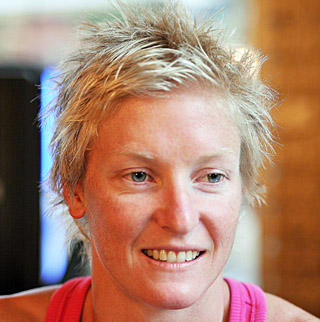
ST: How did it end?
Melissa: He ditched me just before the 2004 Olympics. We were in Flagstaff [Arizona] and he said “I’m not coaching you any more. You can go home.” I got on a bus and went to Phoenix and flew out of there. By the time I got home, mentally I wasn't in the right state to go to the Olympics anyway. I was a mess. I was on the phone to my parents every night – in tears.
ST: How long did it take to recover from that experience?
Melissa: Two years. I stayed home in Tweeds with mum and dad. I didn’t stop running completely. But I was depressed and a mental wreck and I ended up going to different people to get counseling. The thing was, Said pretty much turned the rest of Australia against us. I was actually too embarrassed to show my face in the running scene.
ST: Your natural cheerful self I see here was suppressed?
Melissa: I was young and I’d never been in a situation like that. I thought everybody was happy, cheery just like me. But they weren’t. And he turned all the other girls against one another so we could only go to him. If he caught me talking to anyone else, I’d get in trouble. It was very lonely.
ST: How did you go about regaining your spirit?
Melissa: I looked back at the time when I was running well and I wanted to get back there. So I tried to run, but I couldn’t
ST: Did you find support from your old coach?
Melissa: Actually my manager before Said was Nic Bideau.
Bideau is a famous running coach/manager/agent based in Melbourne who had been Australian 400 meter superstar Cathy Freeman’s coach when she won her first world title in 1997. They split up before the 2000 Olympics.
ST: Was he aware of what had happened with Aouita?
Melissa: When I started with Said, he made me get rid of Nic and there were hard feelings. In November 2005 there was a 5000 meter race in Noosa a few miles from where I lived. Nic goes there every year and I finally got up the courage to send him an email and said I am sorry for everything that happened and asked him to see me. We met and straightaway he agreed to start coaching me. I told Nic I just want to get back running and have fun.
ST: How did things go?
Melissa: By March 2006 I got second in the Commonwealth Games women’s 3000-meter steeplechase and broke the Australian record [9:24.29 — 4.78 behind the winner]. Nic let me feel free of the negative pressure. As soon as that was lifted, running was so easy.
ST: This was two years to the Beijing Olympics and the first women’s Olympic steeplechase. So what came next?
Melissa: After the 2006 Commonwealth Games I went to the World Cross Country Championships and I came 11th. [Rollison ran 13:11, 20 seconds behind the winner and 16 seconds back of fellow Aussie Benita Johnson who was 4th] After that I went to China — just a fun race. When I came home, Nic told me to take the week off. In my mind, time off had meant injury. Subconsciously, all those bad feelings started to flood back.
ST: You were experiencing a bit of a flashback?
Melissa: I think so. I had done nothing wrong during the break and I had this pain in my leg. He asked ‘What have you been doing in your week off?” I said “I hadn’t done anything. But I’ve got this pain.” It turned out I had ruptured my hamstring.
ST: So that was a reminder of those traumatic times?
Melissa: Nic had so much faith and confidence in me that he took me overseas and said, “We will get it fixed over there.” But I was on the sidelines. Everyone around me was training and I wasn’t able to train or race. I think that just brought me down even more.
In 2006, Rollison had an operation to fix the ruptured hamstring tendon. After some rest and rehab, she seemed back on track but then was diagnosed with stress fractures in her lower. Later, she suffered a burst cyst in her knee to cap off a horrible year
ST: Didn’t friends offer you emotional support?
Melissa: Whenever this sort of thing happened – I shut people out. When things went well, I was always chatting to my friends and family all the time. But when this sort of thing happened, I froze up. I couldn’t talk to anyone — which made it worse.
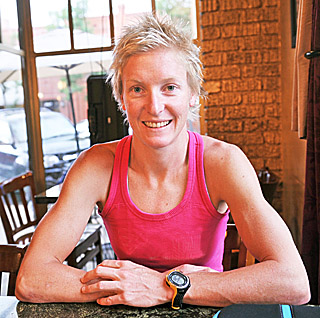
ST: What made you feel unworthy?
Melissa: I felt like if I am not running I am nothing. I was convinced that people only liked me because I was a runner.
By 2008, Melissa recovered to finish second in the Australian women’s 3000 meter steeplechase, but her time of in 9:50 was much slower than her 2006 personal best. She also qualified for the Australian World Cross Country team and had a decent but slower than her 2006 level 26th-place finish.
ST: What happened when the Australian Olympic Trials for 2008?
Melissa: I won the nationals and at the trials before the Olympics, I came second. But I missed the A standard qualifying time of 9:48 by two seconds.
ST: That is 24 seconds slower than you ran in 2006?
Melissa: I could not match it.
ST: So when the Beijing Olympics came round, that must have been hard to watch?
Melissa: I thought I can beat all those girls. I had thoughts that if I were healthy I’d win the Olympics. I had no doubt in my mind. It wasn’t cocky. Inside I was sure I could have won.
Gulnara Samitova-Galkina of Russia ran 8:58.81 to win. Rollison’s 2006 PR of 9:24.29 would have placed her 10th.
ST: Where did that inner belief come from?
Melissa: My dad Paul was always really confident in me. He said “You are the best in the world” and I believed that. But Said told me “No you are not the best in the world. You are hopeless.” CHUCKLES IRONICALLY
ST: He was sort of like the Marine drill sergeant in Full Metal Jacket?
Melissa: Yes.
ST: Where were you during the 2008 Olympics?
Melissa: While I was still trying to qualify for the Olympics, subconsciously I knew I wasn't going to make it. I eventually said to Nic, "That's it,” and flew home. Then I went to this health retreat at Gwinganna in Tallebudgera Valley.
ST: That cost a pretty penny?
Melissa: I couldn’t afford it, so I attended in exchange for work and I stayed there for seven weeks. I did it to get away and I didn’t want anybody to know I was a runner. Back home, if I ever went out, people would ask me, "Oh how is your running going?"
ST: Was it nice to be anonymous?
Melissa: It was great. Everyone was positive. It was an organic health retreat and I was really active there. Everybody said to me “You look great. You’re so fit. You're so healthy.” Being around normal people really built my confidence back up. When I was running, people put me on a pedestal.
ST: When did you go back to running?
Melissa: After the 2008 Olympics, I still had bad feelings, but I kept trying to run. Nic said “You’ve got the talent but you are just injury prone.” I kept telling him, "No! It's a mental thing.” He thought I was crazy.
Rollison ran through mid-2010 and won her 5th Australian women’s open 3000 meter steeplechase title. But while trying to qualify for the Commonwealth Games, she suffered another injury. While rehabbing, she bought a bike to do some cross training and ran into some triathletes.
ST: What led you to triathlon?
Melissa: In the winter of 2009 I bought a bike and I started riding and came up on a group of three guys on bikes. They saw I was in running gear and probably wondered what was I doing? I ended up doing a 100k ride with them. One of them said to me, “I can't believe you kept up. Who are you?” I just said “I used to run.” They said “Here is our number. Keep riding with us.” I did and when one of them said he wanted to start racing and joined a cycling club, I said “Racing? I want to race!”
ST: A fresh start?
Melissa: Yes. I joined the cycling club and did some local races. I had no idea about tactics — I just raced from the gun. I started off at the B level and I was winning all my races.
ST: Someone in that club must have nudged you toward triathlon?
Melissa: Phil Stoneman, who used to work for IMG and is now my manager, was in that cycling club. He said “I know you’re a runner.” He had obviously Googled me and saw my results. I said “I don’t run any more. I just like to cycle.” He said, “Have you ever thought about triathlons?” "Naw, I can’t swim." “You can learn. Triathlon could be a good way to go” but I just kept dismissing it. Finally, I heard that there was a duathlon in Queensland and told Phil “I can run-ride-run.” He kept quiet and let me do it. When I won he sat me down and said there is this tri coach, Warick Caziel, who trains juniors in Brisbane and asked me to take one swim session with him. I went and did all right and I thought “Aw, it’s not too bad.” After a few more swim workouts I told Phil, “I kinda like to swim, but I’m not any good.” So he said “Why don’t you try long course?” In mid-2010, I signed up for the Gold Coast half Ironman.
ST: Which you won. But this was much longer than anything you’ve done. What was the hardest thing about it?
Melissa: The mental challenge. After the race people said “Oh you did well because you are a runner.” I said “I’m a 3k runner and that is the first time I've ever run 21k.” During that run I was thinking: “Oh this is hard! I want to pull out.” Then I thought: “You’re not in pain!”
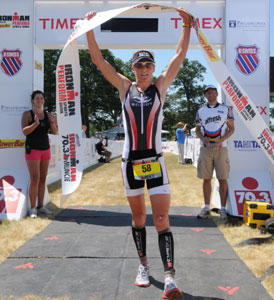
A week after Gold Coast, Rollison entered the Asian Pacific Ironman 70.3 in Laguna Phuket, Thailand and took second there in December.
Melissa: I came out of the water at least 5 minutes down to Caroline Steffen and she put more time into me on the bike. I started the run 10 minutes down and cut it to 5 minutes at the finish.
ST: Did you know how good Steffen was?
Melissa: Not then. But now I do.
ST: How did your 2011 season start?
Melissa: I entered the Port Macquarie half Ironman but I rolled my ankle the night before. I got off the bike first with an 8 minute lead but Jared told me to stop and I pulled out.
ST: Jared is your boyfriend?
Melissa: Yes. We started going out in January 2010. Jared Hauschildt is a runner and he is helping me with triathlons.
ST: Working with a coach is a delicate business for you. It might be even tougher with a boyfriend?
Melissa: A lot of people ask me if I am getting a coach. I say I do not have one and I am not getting one! I have a swim coach and Jared and I work out the rest of my program.
ST: What led you to go to the USA?
Melissa: Phil said there are Ironman 70.3 World Champs in September and I had to get points to qualify. He said there aren’t any races left in Australia, so I had to go overseas. He told me to look at the Ironman website. I did and I said, “Boulder!”
ST: Why Boulder?
Melissa: Benita Johnson is here. Nic used to coach her and we’d done a lot of running together.
Her first race in the US was Muncie 70.3. After some intense improvement in swim technique wrought by coach Zane King back in Brisbane, Melissa’s swim was only 2:51 back of Cave and Williamson. After her bike racing last year, her 2:16:47 split only surrendered two minutes to Cave and put six minutes on Williamson. When she unleashed her race-best 1:19:19 run, Rollison won by 3:31 in a course record 4:08:48.
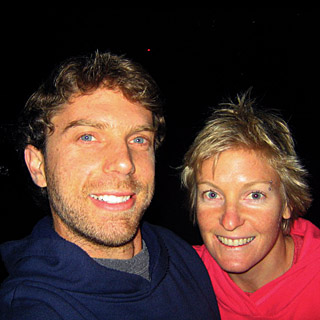
ST: When you crossed the line did you understand what you’d done?
Melissa: I was pretty happy I’d won my first race in America. I still didn’t quite know who these girls were and they didn’t know me either. After the race I said, “Well done“ but Leanda was just kind of looking at me like “Who are you?” But after the presentation, she came over and was very nice. So was Kelly.
One week later at Vineman 70.3, Rollison’s devastating, race-record 1:16:28 run gave her a race record 4:09:00 finish with a 6 minutes 14 seconds margin of victory.
ST: Do you feel freer running as a triathlete?
Melissa: I think the reason things are going so well now is it is just me and Jared and he is not going to put me down if I have a bad race. The thing I am liking now is that I don’t have to report to anyone.
ST: On paper you have to be considered one of the favorites at the Ironman 70.3 World Championship. Are you wary of setting up high ambitions?
Melissa: I am looking forward to it. I told Jared when we talk on Skype that I am really enjoying all of it.
ST: What have you heard from your running friends since you have had such great triathlon success?
Melissa: Nic actually emailed me after that last race and said “It’s good to see you winning. There is still a spot in running in the Olympics for you.” I wrote back immediately: “Not a chance. I’m not going back.” I know I can run. I proved I can run in the half Ironman. But I’m not going back to that world.


